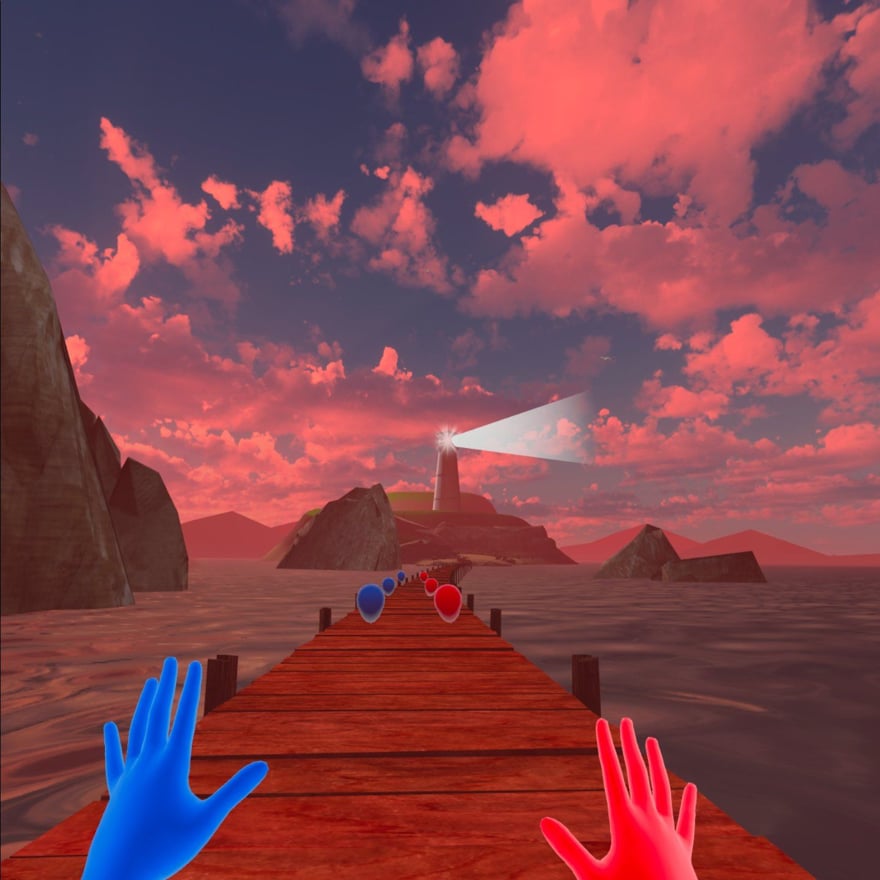
An image from within one of the three games in the RendeverFit package. Image provided by Rendever.
This Week in ARExperience
January 6, 2022 by Jon Jaehnig
- Rendever has shipped RendeverFit, a workout program for seniors meant to exercise both their minds and bodies. The program was announced last year and preorders have been open for months. It is composed of three modules: a cycling program, an upper body program, and a multiplayer 3D painting program.
- Modular mixed reality headset manufacturer DigiLens has announced two major updates to their display technology: a second-generation waveguide with variable aspect ratio, and a 720p polarized light engine. The headset is currently only available to developers.
- XR glasses manufacturer ThirdEye announced the Razor glasses to “expand into the consumer metaverse.” The 85g glasses are compatible with “most” iOS and android phones as well as with computers and gaming consoles through cable connections and adapters. The glasses feature a 43-degree field of view and a 70Hz refresh rate, and are currently available for preorder.

- In other XR glasses news, Vuzix launched the M400-C. This second model in the M400 series connects to a mobile device or computer rather than operating as a standalone device. With an auto-focus HD camera, noise canceling mic, and IP67-protected controls an interfaces, the Vuzix M400-C is priced at $1,200 – $600 less than the stand-alone M400.
- Long-time XR entrepreneur Alan Smithson has penned a “Metaverse Manifesto” to “encourage our industry to build ethically with principles and values” as the term “metaverse” has largely been taken up by people outside of the field. This attempt to encourage serious dialogue is the most recent in a body of work including essays by Tony Parisi and Mathew Ball.
- XRHealth and HTC announced a partnership to bring virtual treatment rooms to the VIVE Focus 3 and VIVE Flow headsets. The virtual treatment rooms will help remote patients access physical and occupational therapy and pain management. Clinicians using XRHealth will be able to create rooms specifically for their remote patients.
- Sony announced the second generation of PSVR, featuring updated optics, inside-out tracking, eye tracking, and a simplified cable system. Immersive features including haptics and audio are afforded by the PS VR2 Sense Controller. A price was not announced in the release, though it was made clear that PSVR2 will only be compatible with the notoriously unattainable PS5.
- Qualcomm and Microsoft announced a collaboration to “expand and accelerate AR” through chips and software platforms. Microsoft already has both hardware and software offerings in the mixed reality space, but the use of Qualcomm’s XR-dedicated chips – already a staple in a number of AR and VR devices – could help Microsoft create a viable consumer offering.
- Samsung announced a partnership with ZEPETO to create a virtual space for its users called “My House.” As a leader in mobile phones, including 5G phones, there is huge potential for any immersive platforms explored by Samsung to become even more immersive through eventual integration with XR accessory hardware.
The two major themes on the news this week seem to be in AR glasses and XR health. Not just XR wellness and fitness, but serious investment and applications by and for practitioners and caregivers.


